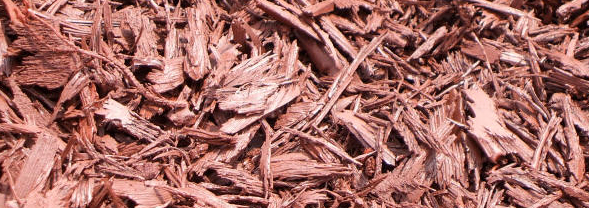
I’ve been receiving a lot of questions about rubber mulch lately. For those of you not familiar with the product, it consists of shredded tires that can be dyed and used on ornamental landscapes or under playground equipment. In fact, the Obamas had this material installed underneath their children’s play structure at the White House. It seems an ideal way to recycle the 290 million scrap tires we generate annually.
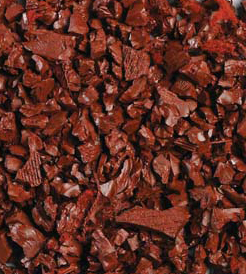

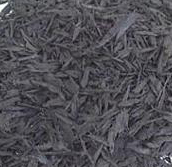
But is it?
It’s not effective: One of the main reasons we use mulch is to suppress weeds. Research has demonstrated that organic mulches such as wood chips, straw, and fiber mats control weeds better than rubber mulch.

It burns: You’ve heard stories about piles of scrap tires catching fire and burning for weeks. Well, those same flammable compounds are in rubber mulch, too. When compared to other mulch types, rubber mulch is the most difficult to extinguish once ignited. In fact, some parks and playgrounds no longer use rubber mulch or rubberized surfaces because vandals have figured out that rubber fires cause a LOT of damage.

It breaks down: Although sales literature would have you believe otherwise, rubber is broken down by microbes like any other organic product. Specialized bacterial and fungal species can use rubber as their sole food source. In the degradation process, chemicals in the tires can leach into the surrounding soil or water.
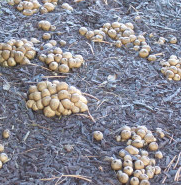
It’s toxic: Research has shown that rubber leachate from car tires can kill entire aquatic communities of algae, zooplankton, snails, and fish. While part of this toxicity may be from the heavy metals (like chromium and zinc) found in tires, it’s also from the chemicals used in making tires. These include 2-mercaptobenzothiazole and polyaromatic hydrocarbons, both known to be hazardous to human and environmental health.
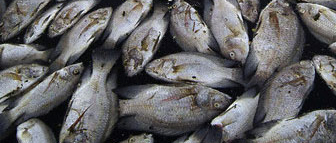
It’s not fun to be around: When rubber mulch gets hot, it stinks. And it can burn your feet. Yuck.

The EPA’s website says this about scrap tires: “Illegal tire dumping pollutes ravines, woods, deserts, and empty lots. For these reasons, most states have passed scrap tire regulations requiring proper management.” So if we have legal tire dumping (in the form of rubber mulch), does that mean it doesn’t pollute anymore?
(You can read a longer discussion on rubber mulches here.)
I've just discovered this blog and am enjoying it immensely so far. I'm a training urban horticulturist in Melbourne, Australia.
In Australia the use of rubber mulch in horticulture hasn't yet come to pass, although it is currently being used on children's playgrounds. The point about illegal tyre dumping being bad for the environment -v- using rubber mulches in urban environments is a great one. What's the difference!?
Careful management of water resources is a big issue down under at the moment – we in Southeastern Australia are in the midst of a 10 year drought, and such things forces one to reassess one's management of water resources. Using rubber mulches made from old tyres is yet another threat to all of our water resources – where ever we live!
Thanks for the info from Australia, Jimbo! Let's hope that your country doesn't see this waste management issue as a marketing opportunity…
Great post, Linda!
As most tires are not "real" rubber, I can't imagine who thought that a petroleum product would make a good mulch.
Was at a park in Florida where they had used it around one of the service areas, and PHEW did it smell in the 95 degree heat.
I came across a great website a while back… http://www.scorecard.org "the pollution information site." Tons of useful info including an at-a-glance- graphic scorecard of human and ecological hazards associated with the compound. Needless to say, 2-mercaptobenzothiazole is some nasty stuff!
Thanks for this site, Holly! Let's hope the EPA begins to develop a spine on this and other obvious pollution problems associated with rubber mulch.
Linda,
Not to hijack the thread – I've never thought rubber was a good idea either.
But as a landscaper I worry about that insidious red dyed mulch. I personally got ill after several days of stripping about 20 yards of that stuff off a new garden I was renovating for a client. It had a terrible chemical smell. I'd like to see that mulch banned all together but it is a big seller at the large discount stores like Menards and Home Depot.
Not at all, SJ! By dyed mulch, do you mean the woody stuff? Or is it another material? Let me know – I'm curious to look into it.
Linda,
It's the shredded woody mulch dyed red. Unless I'm not looking hard enough the bags don't seem disclose what they're dyeing them with. It may be a preservative – but it has overtones of the arsenic laden landscape timbers they used to sell. There must be a preservative in this mulch because it seems to break down very very slowly if at all. I can't imagine that's very good for the environment.
I've use red cedar mulch wood chips for years and have to add mulch each year as it does break down. Not sure if this is dyed or not though.
As for rubber mulch, I tried that in a small area and it was awful as Linda states.
I just looked up info on our red cedar mulch at http://www.amway.com (typed in red cedar mulch in the search) and it states that the red mulch we use is 100% natural red color.
Sorry, the www address in my above post is wrong.
It's http://www.agway.com
Speaking of rubber mulch. We had a bird feeder up in the middle of the yard with sunflowers in it. The seeds would fall and sprout. So, I placed a circle of rubber mulch around the bottom of the feeder. BIG MISTAKE! The rubber mulch got so hot that the poor birds would not even walk on it. The rubber mulch smelled so foul. The sunflowers seeds still sprouted right up through the rubber mulch. I could go on and on. Rubber mulch should not be sold as it is not only bad for the environment, but, a useless mulch!
SJ and Jim – it looks like the dye depends on the manufacturer. Many of the dyes appear to be safe – the problem may very well be the wood used. Some manufacturers apparently use old pallets and treated timbers, which of course can be contaminated with pesticides and arsenic, respectively. I'm betting your problem may have been more related to those substances than to the dye. As a heads up, I would make sure that any purchased wood chip mulch actually came directly from trees, and not some unknown wood product.
I contacted Agway about the red cedar mulch they sell. The mulch we use. The red cedar mulch is actually Atlantic white cedar, that is dyed red.
There are some negative effects of rubber mulch – but I don't think that there is strong enough evidence that is going to stop its production. If people maintenance their tires more often, and take better care of their tires (which also increases safety while driving) it can help reduce that large number of scrap tires currently at 290 million.
Encased in stucco/cement scrap tires can be used as building materials or to create bird bath or planter. It's the cement/stucco that keeps the bad stuff contained. It can be decorated with mosaic – we're going to try that in our neighborhood.
hi stumbled on your site, and can i say with the utmost respect theres always someone bagging out something, i think the concept of useing what is ultimatly a product once its served its generally regarded purpose more often then not is landfilled, we have used rubber mulch n our yards as has many people we know and respect, and i can vouge whole heartedly that this product is great, living in WA where we seem to have major water issues, the fact it is non porus means we arent maintaining oour gardens with the amount of water generally we have used, we no longer have ants or cochroaches(we live in Acerage) and i believe thats as a result of the general mulch we used to use,the fact it is pure cosmetic, has ment we arent minimised as to where we can use it, as all our plants have thrived, and as for the heat it is definatley warmer then normal mulch, but i can say and ask tongue in cheek,who does play and run in the yards when it is stiffling hot. And lastly as stated im glad there are people out there prepared to go a litle further producing something that ultimately is good for the enviroment as it is getting rid of something ultimatly we all have to deal with in mass years from now.
but keep up your great blog, but please dont disregard and mock something just cause its easier to do.
thanks
Matt
The trouble with tyres is there are so many of them! I can't help thinking that if there is something useful that can be done with them then that can only be a good thing. Perhaps it's just a question of being very careful where the rubber mulch is used – obviously public parks is not such a good idea. I don't think we can afford to dismiss too many options these days.
Can rubber tire mulch have an adverse affect when used around young bougainvillea plants?
Sure, Stuart, I imagine the heat retained and reflected from rubber mulch would injure nearly any young plant. Whether or not there are adverse chemical effects would be tough to determine, but the heat injury would not. If you have photos, you could send them to me and I’d be happy to post them.